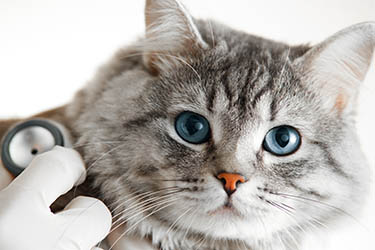Preparing Pets for Surgery

How to Prepare When Your Cat or Dog is Having Surgery
Pet surgery doesn’t have to be stressful or scary, if you prepare your pet and yourself properly, you can make the experience much easier! Read on to learn the basics of pet surgery and what to expect.
Pre-surgery
Understanding the procedure
When you schedule your pet’s surgery, your vet will give you instructions to prepare for the procedure. Make sure you ask ahead for anything specific to your pet — like if they need medication or have a health issue where they might need to eat instead of fast — so you can be fully prepared.
General anesthesia
It’s common for your cat or dog to be placed under general anesthesia when undergoing an operation like spaying or neutering. The anesthesia will suppress your pet’s nervous system so they will be unconscious and will not be able to feel anything! There will be a surgical assistant or vet tech present to help the surgeon monitor your pet’s vitals, and they’ll keep tabs on blood pressure, heart rate and body temperature.
Before administering general anesthesia, your vet may recommend a pre-anesthetic blood screen to ensure their health is in an acceptable state to undergo the procedure. They may also suggest placing an IV or intravenous catheter to help keep your pet hydrated, and in the case of an emergency, administer life-saving medication. But don’t worry, most pets have no trouble with general anesthesia, and if they do have a negative reaction, they’ll be in the safest hands possible.
It’s crucial to follow your vet’s directions before your pet’s surgery in order to prevent any reactions from developing. This will likely include fasting for a specific period of time before the operation (usually beginning at midnight or earlier).
Local anesthesia
If your cat or dog only needs local anesthesia for their procedure, they will not be unconscious. A local anesthetic will be placed only on the area of their body that needs attention. Your vet may or may not have your pet fast before this procedure.
Dropping off your pet
When you’re dropping off your pet for surgery, make sure you ask all questions before leaving. Your vet will be happy to answer anything you want to know before the surgery so you can leave feeling your pet is in the safest hands. You will also need to sign legal consent forms that state you are allowing the vet to perform the surgery and any agreed-upon pre-anesthetic tests.
Post-surgery
Picking up your pet
Thanks to advances in modern science, your pet should recover fairly quickly from their surgery! Depending on the procedure, your vet may or may not want to keep them overnight for observation. When you arrive to pick up your pet, they should be acting pretty close to normal, but they might be a little tired or disoriented.
Your vet clinic will leave you with discharge instructions, but be sure to review everything before you leave. Things you need to know include:
- Whether your pet needs to take medication and details on dosage
- If you need to come back for suture removal or a check up
- How to check and care for areas around operation
- What to look for in a healing incision, and how to help keep it dry and clean
If your cat or dog needs to be seen for a follow up appointment, schedule it while you’re there so you don’t forget.
Caring for your pet at home
The nature of your cat or dog’s surgery will determine how much post-surgery care and attention they’ll need. They may need to be confined to a small space, like a room or crate, or separated from other pets while you’re away from home.
If your pet has an incision they can reach, your vet will probably suggest you use an e-collar to prevent them from licking the wound. Monitor the site every day for bruising, swelling, oozing and bleeding. You will also need to keep your pet from playing too hard while they’re recovering, so it’s a good idea to take dogs outside on a leash rather than allowing them to run free for several days to a week following the surgery.
Pay close attention to your pet to make sure they’re not showing any signs of distress like lethargy, shivering, diarrhea, vomiting, loss of appetite or not wanting to drink water. If your cat or dog is exhibiting any of these signs following their surgery, call your vet right away.
Just remember that surgical procedures are common and vet staff members are highly trained to treat and care for your pet. By following your vet’s instructions and giving your pet a little extra TLC, your pet will soon be happier and healthier than ever!
Visit us online or contact your Covetrus representative at 855.724.3461 to order supplies and medications for your practice.
Sources
How Do I Prepare for My Dog or Cat Having Surgery?
Careers
Are you looking for a place to let your talents shine? At Covetrus, we help our practitioner customers better serve their patients and take pride in providing the best customer experience possible. Search our open positions to see our available opportunities.
Newsletter
Stay current with what’s going on with Covetrus, subscribe to receive our newsletter and email communications. Subscribers will receive the latest information in practice management, sales and marketing, animal health, and more.


Leave a comment